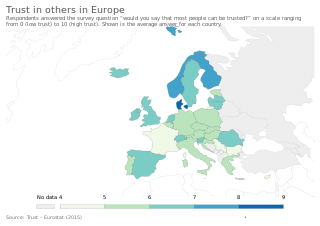
Marketing is the act of satisfying and retaining customers. It is one of the primary components of business management and commerce.
A market system is any systematic process enabling many market players to offer and demand: helping buyers and sellers interact and make deals. It is not just the price mechanism but the entire system of regulation, qualification, credentials, reputations and clearing that surrounds that mechanism and makes it operate in a social context. Some authors use the term "market system" to refer to specifically to the free market system. This article focuses on the more general sense of the term according to which there are a variety of different market systems.

Consumerism is a social and economic order in which the aspirations of many individuals include the acquisition of goods and services beyond those necessary for survival or traditional displays of status. It emerged in Western Europe before the Industrial Revolution and became widespread around 1900. In economics, consumerism refers to policies that emphasize consumption. It is the consideration that the free choice of consumers should strongly inform the choice by manufacturers of what is produced and how, and therefore influence the economic organization of a society.

Corporate social responsibility (CSR) or corporate social impact is a form of international private business self-regulation which aims to contribute to societal goals of a philanthropic, activist, or charitable nature by engaging in, with, or supporting professional service volunteering through pro bono programs, community development, administering monetary grants to non-profit organizations for the public benefit, or to conduct ethically oriented business and investment practices. While once it was possible to describe CSR as an internal organizational policy or a corporate ethic strategy similar to what is now known today as Environmental, Social, Governance (ESG); that time has passed as various companies have pledged to go beyond that or have been mandated or incentivized by governments to have a better impact on the surrounding community. In addition, national and international standards, laws, and business models have been developed to facilitate and incentivize this phenomenon. Various organizations have used their authority to push it beyond individual or industry-wide initiatives. In contrast, it has been considered a form of corporate self-regulation for some time, over the last decade or so it has moved considerably from voluntary decisions at the level of individual organizations to mandatory schemes at regional, national, and international levels. Moreover, scholars and firms are using the term "creating shared value", an extension of corporate social responsibility, to explain ways of doing business in a socially responsible way while making profits.
Ethical consumerism is a type of consumer activism based on the concept of dollar voting. People practice it by buying ethically made products that support small-scale manufacturers or local artisans and protect animals and the environment, while boycotting products that exploit children as workers, are tested on animals, or damage the environment.

Trust is the belief that another person will do what is expected. It brings with it a willingness for one party to become vulnerable to another party, on the presumption that the trustee will act in ways that benefit the trustor. In addition, the trustor does not have control over the actions of the trustee. Scholars distinguish between generalized trust, which is the extension of trust to a relatively large circle of unfamiliar others, and particularized trust, which is contingent on a specific situation or a specific relationship.
Switching barriers or switching costs are terms used in microeconomics, strategic management, and marketing. They may be defined as the disadvantages or expenses consumers feel they experience, along with the economic and psychological costs of switching from one alternative to another. For example, when telephone service providers also offer Internet access as a package deal they are adding value to their service. A barrier to switching is then formed as swapping internet services providers is a time consuming effort.
In business analysis, PEST analysis is a framework of external macro-environmental factors used in strategic management and market research.
Sustainability advertising is communications geared towards promoting social, economic and environmental benefits (sustainability) of products, services or actions through paid advertising in media in order to encourage responsible behavior of consumers.
Marketing ethics is an area of applied ethics which deals with the moral principles behind the operation and regulation of marketing. Some areas of marketing ethics overlap with media and public relations ethics.
Institutional logic is a core concept in sociological theory and organizational studies, with growing interest in marketing theory. It focuses on how broader belief systems shape the cognition and behavior of actors.
Micromarketing was first referred to in the UK marketing press in November 1988 in respect of the application of geodemographics to consumer marketing. The subject of micromarketing was developed further in an article in February 1990, which emphasised understanding markets at the local level, and also the personalisation of messages to individual consumers in the context direct marketing. Micromarketing has come to refer to marketing strategies which are variously customised to either local markets, to different market segments, or to the individual customer.

The study of the history of marketing, as a discipline, is meaningful because it helps to define the baselines upon which change can be recognised and understand how the discipline evolves in response to those changes. The practice of marketing has been known for millennia, but the term "marketing" used to describe commercial activities assisting the buying and selling of products or services came into popular use in the late nineteenth century. The study of the history of marketing as an academic field emerged in the early twentieth century.
Market environment and business environment are marketing terms that refer to factors and forces that affect a firm's ability to build and maintain successful customer relationships. The business environment has been defined as "the totality of physical and social factors that are taken directly into consideration in the decision-making behaviour of individuals in the organisation."

Chrematistics, or the study of wealth or a particular theory of wealth as measured in money, has historically had varying levels of acceptability in Western culture. This article will summarize historical trends.
Nudge theory is a concept in behavioral economics, decision making, behavioral policy, social psychology, consumer behavior, and related behavioral sciences that proposes adaptive designs of the decision environment as ways to influence the behavior and decision-making of groups or individuals. Nudging contrasts with other ways to achieve compliance, such as education, legislation or enforcement.
Traditionally, market orientation (MO) focuses on microenvironment and the functional management of an organisation. However, contemporary organisations have widened their focus to incorporate more roles, functions and emphasis on the macro environment. Firms have been concerned with short run success and often not taken into account the long-run ecological, social and economic effects from their activities. Despite growth in the MO concept, there is still a need to reconceptualise the concept with a greater emphasis on external factors that influence a firm.
Islamic marketing is a process of attempting to sell a product or service to customers and other stakeholders while keeping this process in accord with the principles of Islamic transaction. This includes maintaining halal for the products or services being marketed.

Slow fashion is an aspect of sustainable fashion and a concept antithetical to fast fashion. It is part of the "slow movement" advocating for clothing and apparel manufactured with respect to people, the environment and animals. As such, contrary to the industrial practices of fast fashion conglomerates, slow fashion involves local artisans and the use of eco-friendly materials.
Brand activism refers to the practice of businesses taking public stances on social, political, economic, or environmental issues, with the aim of contributing to societal change. Unlike traditional corporate social responsibility (CSR), which often focuses on philanthropy and internal ethical practices, brand activism involves actively addressing contentious social or political issues, such as systemic racism, reproductive rights, gun control, LGBTQIA+ rights, immigration, sexual harassment, and public health.






